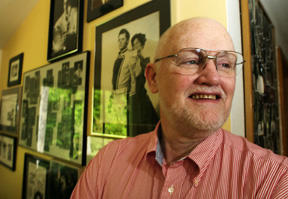Michael Trimble was a football star, until he opened his mouth.
A student on a football scholarship at a Texas junior college, Trimble was recruited by a teacher from the music department for a bit part in Carlo Menotti’s opera, “Amahl and the Night Visitors.”
“I was just a football player taking Speech because it was a ‘gut class,’” said Trimble, who speaks to Bainbridge Music and Arts on Sept. 20.
“A gentleman came in and said, ‘We need some big kid to play the slave.’ He neglected to tell me I would have to sing.”
When the music teacher heard Trimble’s untutored but promising tenor, he started training him.
“I was sort of open to anything,” Trimble said. “I would take my guitar to the football games and play country and rock ‘n’ roll to the players on the bench. The coach liked it.”
Trimble went on to win both the Metropolitan Opera Auditions and the American Opera Auditions in 1963, and made his debut in Milan at the Teatro Nuovo as Cavaradossi in Puccini’s “Tosca.”
For the next 30 years, he performed with the likes of conductors Karl Bohm and Karl Richter. He taught at Cleveland Institute of Music and Aspen Music festival, among other venues.
In 2001, he moved to the island with his wife, vocalist and coach Pam Trimble, and opened the Trimble Vocal Institute.
Tough training
There’s a timeline for learning to sing, Trimble says.
While it usually does no harm to let a child sing, as youngsters vocalize correctly by instinct, young adolescents must be protected from developing bad habits.
Trimble believes that it is often best to back off from formal training for a few years.
“The body is undergoing complicated changes,” Trimble said. “It’s easy for singing to go awry at that point.”
He might advise students to swim or and to play a wind instrument for a few years, and to return to voice training at 14 or 15.
Trimble’s approach to teaching reflects his athletic training.
He has studied tae kwon do for 11 years, and he makes his students take martial arts classes.
“I was an athlete, a college football player – the body is the instrument,” Trimble said.
Opera is particularly strenuous, Trimble maintains. An opera singer must vocalize in a foreign language, act, remember all the words and stay in character for as long as four or five hours.
Besides physical strength and training, it takes emotional stability to cope with performing. Trimble admits that some degree of stage fright goes with the territory.
“Anyone who wants to be good will be nervous,” Trimble said, “and I was always excited.”
Salad days
Opera singers develop dietary “do’s and don’ts” to enhance singing, and Trimble says he was no exception.
Chocolate, bananas and nuts will produce phlegm, and tea will make one too dry. But meat, salad and water are an acceptable pre-performance meal.
Some singers have more exotic tastes, Trimble says – like operatic soprano Eileen Farrell, who would shake a Coca Cola to get rid of the “fizz,” and keep it offstage to drink warm during performances.
Over the last decade, Trimble stopped performing because “it just got too hard, physically, mentally and emotionally.”
But singers trained by him are found singing worldwide – and locally.
A former student of Trimble’s, Paul Lyon, will appear as the lead in the upcoming Seattle Opera production of “Fidelio.”
Current student Kim Josephson – who flew in from Oklahoma for a lesson last week on his way to New York City – will appear in Seattle Opera’s upcoming production of “Girl of the Golden West.”
“It was definitely the long way round,” Trimble said, “but people travel all over the world to work with a good voice teacher.”



